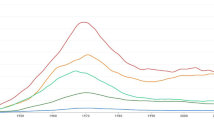Abstract
George Stigler is commonly seen as one of the central figures in the Chicago School of Economics. However, he did not actually take a faculty position at the University of Chicago until the age of 47. This essay will provide a narrative account of George Stigler’s various career transitions from graduate school through his “retirement.” This narrative structure will be employed to bring out what archival material implies about a number of general themes regarding Stigler’s career. Particular attention will be devoted to the 1946 episode in which Chicago failed to make him an offer and the 1957–1958 episode in which W. Allen Wallis successfully induced him to take charge of the Walgreen Foundation and Walgreen Professorship. A first theme considered concerns the role of contingency in Stigler’s academic appointments. A second theme concerns the intellectual diversity of the academic milieus in which Stigler operated, which runs counter to the conventional view of a monolithic Chicago School focused on free markets. A third theme concerns the extent to which Stigler was a partisan or a scientist in his academic endeavors. This aspect entails whether he viewed the economics profession as more swayed by the social environment of its times or whether it made independent scientific and intellectual contributions to social policy. A final theme will concern the extent to which Stigler, as Nik-Khah has suggested, was an empire builder, especially during his tenure as the Walgreen Professor of American Institutions and then in establishing the Center for the Study of the Economy and the State. Brief consideration is also given to the issue of how to reconcile these contrasting, if not conflicting, features of Stigler’s career.
Access this chapter
Tax calculation will be finalised at checkout
Purchases are for personal use only
Similar content being viewed by others
References
Archival Sources
Arthur Burns Papers.
Ronald Coase Papers.
George J. Stigler Papers.
University of Chicago Economics Department Minutes.
University of Chicago, Office of the President, Kimpton Administration.
Wallis, W. Allen, Oral Interview with William T. Meckling. Copy at W. Allen Wallis Papers, Box 20, University of Rochester Special Collections.
Published Sources
Boyer, John W. (2015) The University of Chicago: A History. Chicago: University of Chicago Press.
Boyer, John W. (2016) “The Interwar Period: Hutchins and the Walgreen Affair.” In John Boyer, Academic Freedom and the Modern University: The Experience of the University of Chicago: 27–65. http://college.uchicago.edu/sites/college.uchicago.edu/files/attachments/Boyer_OccasionalPapers_V10.pdf, May 20, 2016.
Fourcade, Marion and Rakesh Khurana (2013) “From Social Control to Financial Economics: The Linked Ecologies of Economics and Business in Twentieth Century America.” Theory and Society 42: 136–154.
Friedman, Milton and Rose D. Friedman (1998) Two Lucky People: Memoirs. Chicago: University of Chicago Press.
Hammond, J. Daniel and Claire Hammond (2006) Making Chicago Price Theory: Friedman–Stigler Correspondence 1945–1957. London: Routledge.
Khurana, Rakesh (2007) From High Aims to Hired Hands: The Social Transformation of American Business Schools and the Unfulfilled Promise of Management as a Profession. Princeton: Princeton University Press.
MacLean, Nancy (2017) Democracy in Chains: The Deep History of the Radical Right’s Stealth Plan for America. New York: Viking.
Mayer, Milton (1993) Robert Maynard Hutchins: A Memoir. Berkeley: University of California Press.
Mitch, David (2016) “A Year of Transition: Faculty Recruiting at Chicago in 1946.” Journal of Political Economy, 124(6): 1714–1734.
Nik-Khah, Edward (2011) “George Stigler, the Graduate School of Business, and the Pillars of the Chicago School.” In Thomas A. Stapleford, Philip Mirowski, and Robert Van Horn, Building Chicago Economics. New York: Cambridge University Press: 116–147.
Stigler, George J. (1963) The Intellectual and the Market Place and Other Essays. New York: The Free Press of Glencoe.
Stigler, George J. (1982) The Economist as Preacher and Other Essays. Chicago: University of Chicago Press.
Stigler, George J. (1982/1983) “Nobel Lecture: The Process and Progress of Economics.” Journal of Political Economy, 91(4): 529–545.
Stigler, George J. (1988) Memoirs of an Unregulated Economist. New York: Basic Books.
Stigler, George J. (2009) Lecture presented 1985 published in William Breit and Barry T. Hirsch, eds. Lives of the Laureates. Fifth Edition. Cambridge, MA: M.I.T. Press: 79–93.
Overtveldt, Johan Van (2007) The Chicago School: How the University of Chicago Assembled the Thinkers Who Revolutionized Economics and Business. Chicago: Agate.
Wallis, W. Allen (1993) “George J. Stigler: In Memoriam.” Journal of Political Economy, 101(5): 774–779.
Acknowledgements
Stephen Stigler graciously provided a copy of Frank Knight’s reference letter for George Stigler to T.W. Schultz and provided access to his copy of the Meckling interview with W. Allen Wallis.
Author information
Authors and Affiliations
Corresponding author
Editor information
Editors and Affiliations
Copyright information
© 2020 The Author(s)
About this chapter
Cite this chapter
Mitch, D. (2020). George Stigler’s Career Moves: The Roles of Contingency, Self-Interest, Ideology, and Intellectual Commitment. In: Freedman, C. (eds) George Stigler. Palgrave Macmillan, London. https://doi.org/10.1057/978-1-137-56815-1_8
Download citation
DOI: https://doi.org/10.1057/978-1-137-56815-1_8
Published:
Publisher Name: Palgrave Macmillan, London
Print ISBN: 978-1-137-56814-4
Online ISBN: 978-1-137-56815-1
eBook Packages: Economics and FinanceEconomics and Finance (R0)




